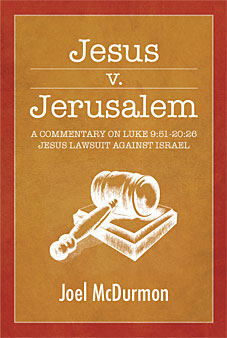Jesus vs. Jerusalem
A Commentary on Luke 9:51-20:26
Jesus’ Lawsuit Against Israel
 .
.
I haven’t read this, but it sounds like an eye-opener for those new to preterism. Perhaps this approach will be helpful in getting Christians used to thinking more contextually about the New Testament:
“Most people don’t realize that many if not most of Jesus’ parables were intended not as general morality tales, but as particular pronouncements of coming judgment and change. Jesus was warning Jerusalem to repent and to accept its new King (Jesus) or else fall under ultimate condemnation of God.
In fact, much of Jesus’ teaching in the Gospels pertains primarily to that pre-AD 70 crowd, and without reading it in this light, we misunderstand it. And when we misunderstand it, we misapply it.
The section of Luke covered in this commentary requires this understanding. The parables Jesus tells during His final journey to Jerusalem (Luke 9:51–20:26, and beyond) almost all pertain to the rebellion, faithlessness, judgment, and coming destruction of Jerusalem, and the salvation of a tiny remnant of His elect people.”
From the Foreword:
“Joel McDurmon’s work is original. He goes where few commentators have gone before. As he shows in page after page of tightly argued points, there is a unity to the prophetic message of the gospels and the rest of the New Testament. It’s about new wine in new wine skins. Everything about the old covenant was planned obsolescence. Jesus was always in view, from the first promise of a savior in Genesis 3:15 to the revelation that ‘the testimony of Jesus is the spirit of prophecy’ in Revelation 19:10. So much of modern-day prophecy commentary is an attempt to rebuild what was never meant to be rebuilt. The parables, as Joel makes abundantly clear, serve to show that the breaking down of the dividing wall was on the horizon for them and the world with the result that there would be ‘one new man’ in Christ (Eph. 2:11–22). The destruction of Jerusalem and the dismantling of the temple’s stones were a foregone conclusion because Jesus had always been the reality over the shadow (John 2:19).” – Gary DeMar
Available here.
See also How to Read the New Testament.


























May 13th, 2011 at 11:54 pm
I’d like to share this but how on the iPhone?
May 14th, 2011 at 9:16 am
Show off
May 14th, 2011 at 5:27 pm
I know you know I’m no preterist. From my perspective, the synoptics were written before AD 70, John after. That would explain to vast difference in material: the world concerns had changed so dramatically.
May 14th, 2011 at 6:31 pm
Everyone agrees John is a different kettle of fish, but I can think of a number of reasons why I think John is pre-AD70, not least his gospel’s correspondence with the book of Revelation (Warren Gage has a work on this) and John’s use of the Tabernacle as a literary structure at a number of levels.
There are also parallels between his gospel and his epistles, which were final warnings to Jews before the “decommissioning of the office of Jew.” John puts Jesus’ cleansing of the Temple out of chronological sequence, near the beginning, to set the theme for his gospel — the cleansing of the Temple!
Other than this, there’s structural evidence from the Old Testament that the entire Bible should be finished before the end of Temple worship, plus the “sealing up” of vision and prophecy in Daniel. After AD70 there was no longer any testifying “head,” only body and Spirit.